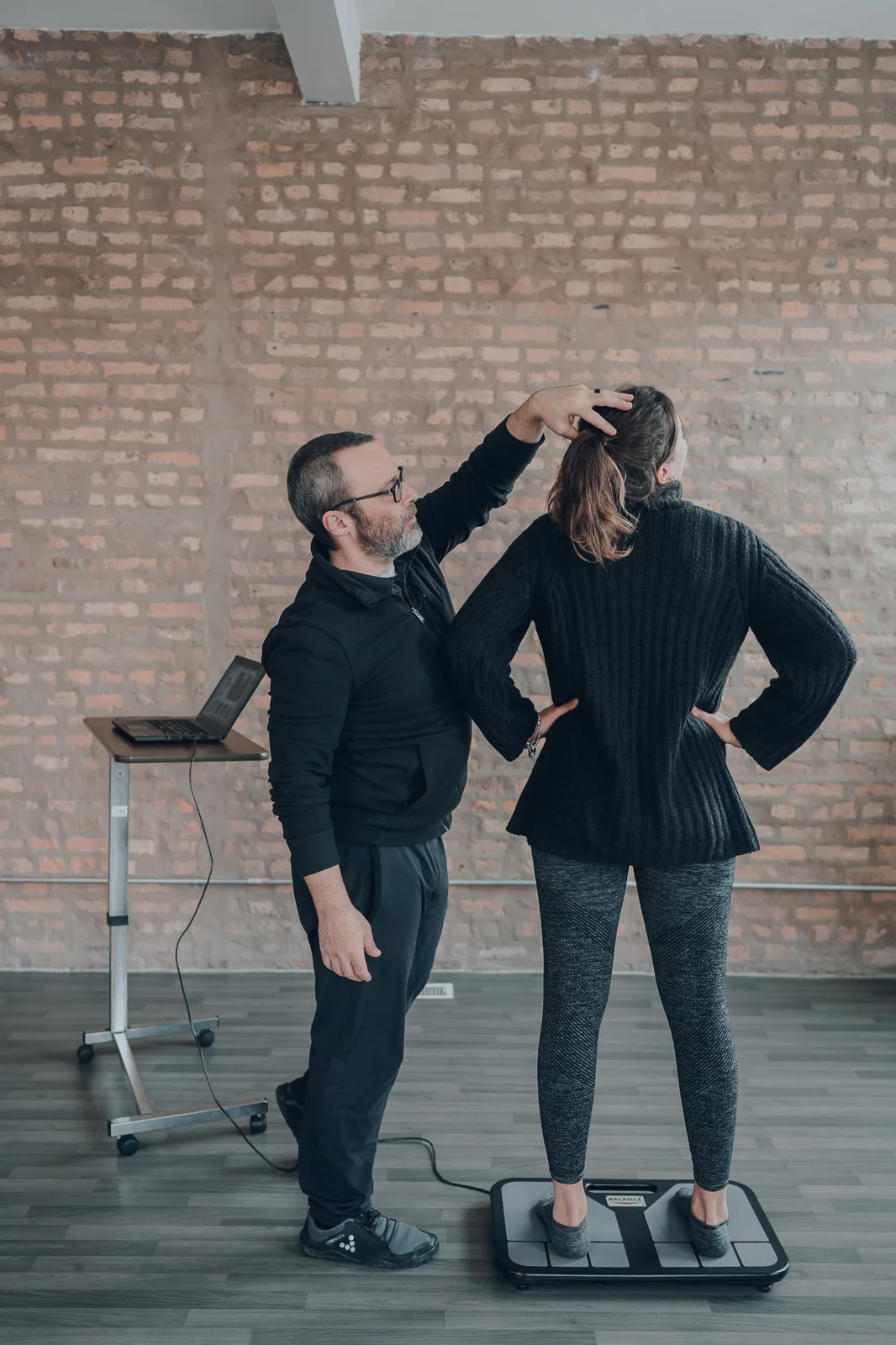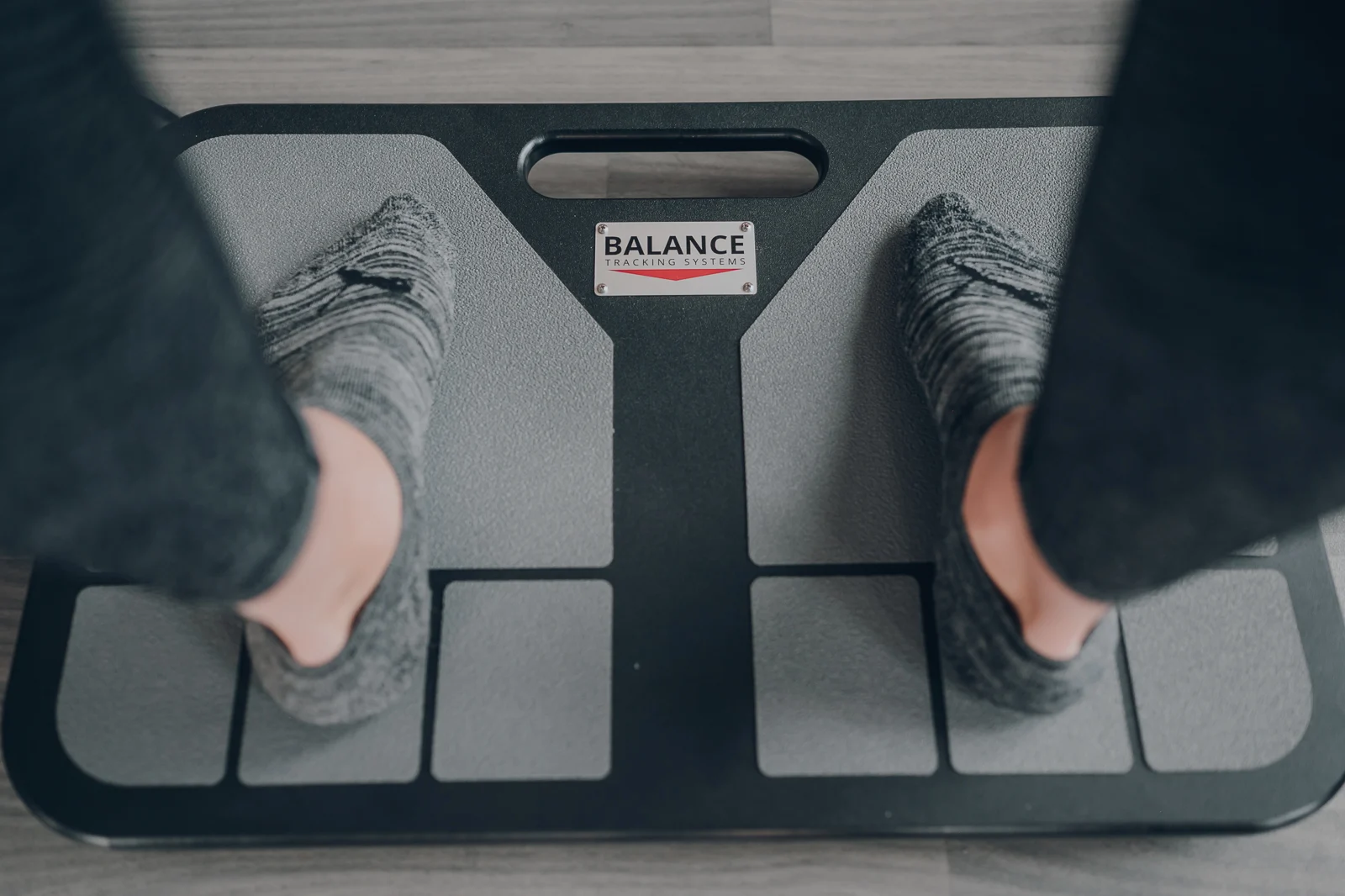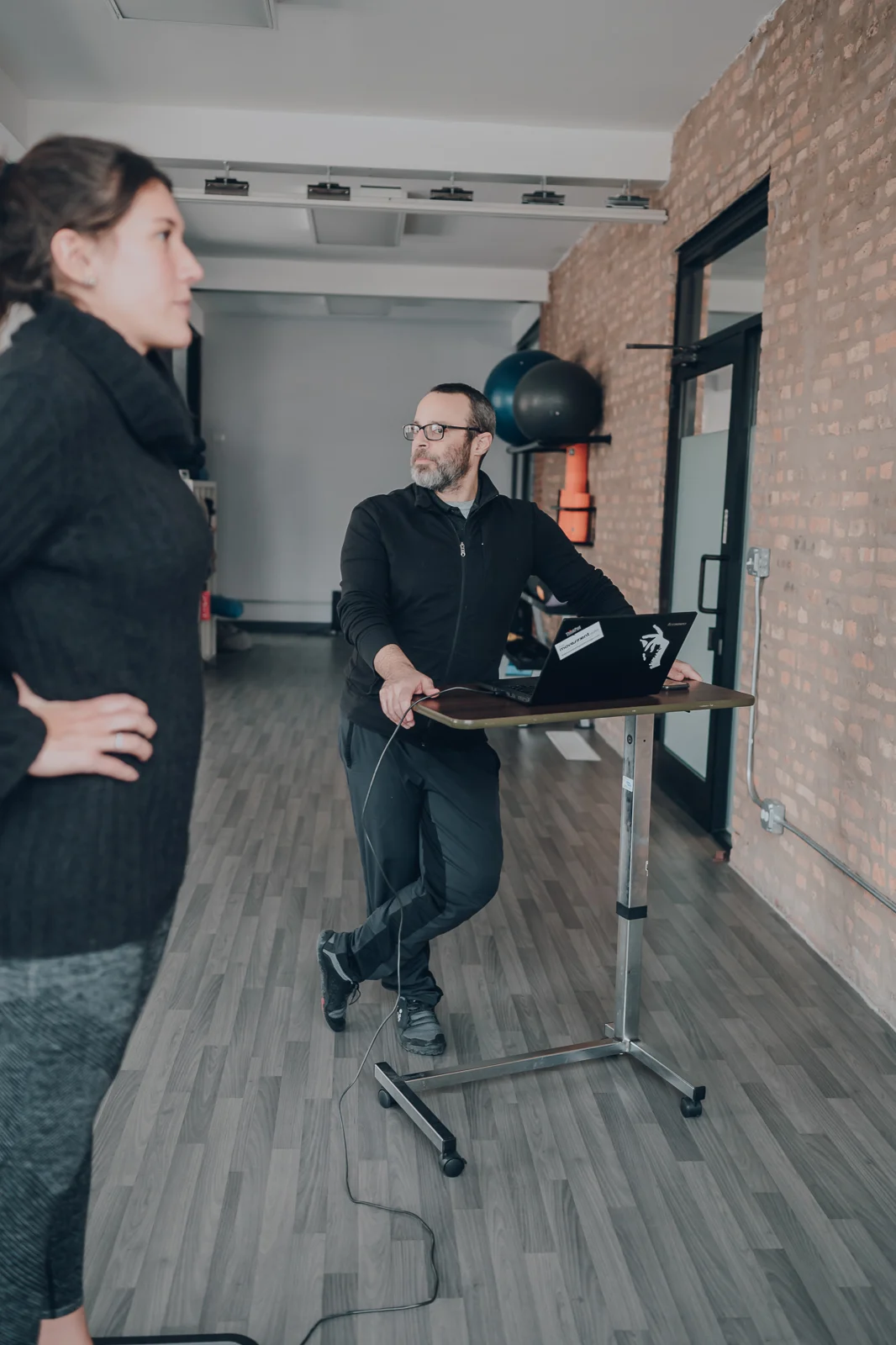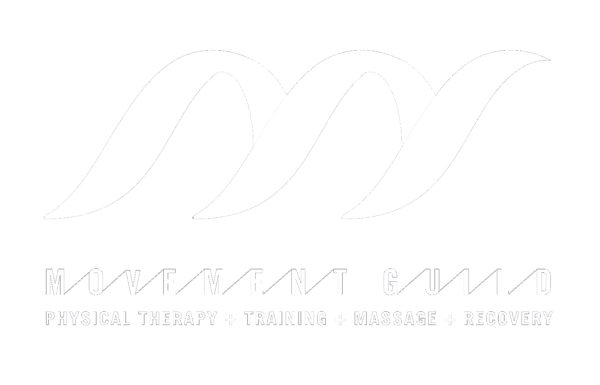Balance & Fall Risk Assessment In Chicago, IL

Expert Fall Prevention Services in Chicago, IL – Montrose, West Loop & Surrounding Areas
Don’t let falls compromise your independence. At The Movement Guild, we use advanced balance assessment technology to identify your fall risk and create personalized prevention strategies that keep Chicago residents moving confidently through their neighborhoods.
Why Choose The Movement Guild for Balance Assessment in Chicago?
The Movement Guild stands apart from other Chicago physical therapy clinics through our unique combination of advanced technology, extensive experience, and proven results. We maintain a 5-star Google rating with over 175 reviews from satisfied Chicago residents, reflecting our commitment to exceptional balance and fall prevention care.
What Sets Us Apart:
- 19 years of clinical excellence in Illinois
- Advanced Balance Tracking System technology
- Brain-based approach to physical therapy
- Serving diverse neighborhoods from West Loop to Montrose
- Former WNBA Director of Player Care expertise
About Dr. Adam Wolf – Your Chicago Balance Expert
Dr. Adam Wolf, PT, LMT, FAFS, brings 19 years of specialized experience in brain-based physical therapy to Chicago residents. As founder of The Movement Guild, Dr. Wolf has developed innovative approaches that address the root causes of balance issues, earning recognition as a trusted resource for resolving complex physical challenges when other treatments have failed.
Professional Credentials:
- Licensed Physical Therapist & Massage Therapist (Illinois)
- Fellow in Applied Functional Science (Gray Institute)
- Former Director of Player Care, WNBA
- Author, Educator, and Professional Sports Consultant
Advanced Certifications:
- Functional-Neuro-Orthopedic Rehab (FNOR)
- Neurokinetic Therapy (Level 3)
- Vestibular Rehabilitation Specialist
- Functional Range Conditioning (FRC)
- Dry Needling Certified
- Running Mechanics Expert (Enhance Running Technician)
Your Balance, Measured with Precision
At The Movement Guild, we believe balance is more than just staying upright – it’s the foundation for moving confidently through life. Our Balance & Fall Risk Assessment uses advanced technology to measure how your body maintains stability, giving you clear, objective insights into your balance and fall risk.

How Our Balance Tracking System Works
We use our state-of-the-art Balance Tracking System to measure postural sway – the small, natural adjustments your body makes to stay steady. These movements reflect how well your muscles, joints, and sensory systems are working together. Unlike traditional assessments that rely on subjective observations, our precision measurement system delivers quantifiable results that can be tracked over time.
What You’ll Learn from Your Assessment:
- Baseline Measurement – Your personal starting point, so we can track changes over time
- Progress Tracking – Follow-up assessments to measure improvements since your baseline
- Percentile Ranking – See how your results compare to peers your age in Chicago
- Fall Risk Analysis – An easy-to-understand summary of your likelihood of falling, plus the factors influencing it
- Advanced Metrics – Insights into movement patterns, including step length, stride time, sway velocity, and center of pressure shifts
The Movement Guild’s 5-Stage Treatment Method
Our evidence-based approach follows a systematic process designed to identify root causes and create lasting solutions for balance challenges.
Stage 1: EVALUATION
The evaluation stage is all about YOU. We do the detective work to find the root cause of your problem. Our comprehensive evaluation includes medical history review focusing on Chicago lifestyle factors, strength and mobility testing, vision and reflex assessment, balance-specific testing protocols, and environmental risk factor analysis.
Stage 2: REMAP
The remapping stage involves hands-on care and specific exercises to manage pain, permit tissue healing, and allow brain-driven remapping of the injured area. This critical phase addresses the neurological components of balance disorders through targeted interventions.
Stage 3: REBUILD
Progression of exercises to heavier loads, faster movements, greater balance, coordination, and cognitive challenges. Symptoms often disappear here, but the capacity built is essential to reinjury resistance. Our progressive protocols include:
- Graduated loading exercises
- Balance and coordination challenges
- Cognitive-motor integration training
- Chicago-specific movement patterns
Stage 4: PERFORMANCE OPTIMIZATION
This stage is crucial as it allows what has been rebuilt to be applied to the movement demands specific to your activity. Otherwise, you may fall back into the faulty injury patterns and/or limit your performance potential. We focus on real-world Chicago applications:
- Navigating uneven sidewalks
- Public transit boarding and exiting
- Stair climbing in Chicago buildings
- Weather-related balance challenges
Stage 5: RECOVERY
As you return to sport and everyday activities, periodic PT can help maintain the progress you’ve made. It will be as if the injury never occurred in the first place. Our maintenance strategies include seasonal adjustment protocols and ongoing progress monitoring.

Why Balance Assessment Matters
Identifying changes in balance early can make a big difference in reducing fall risk. Regular follow-up assessments help you see your progress and guide targeted strategies to improve stability, confidence, and mobility. Whether you’re recovering from an injury, noticing changes in your balance, or simply want to stay proactive, our team will help you understand your results and create a plan to keep you steady on your feet.
Don’t wait for a fall to tell you there’s a problem. Our Balance & Fall Risk Assessment is quick, non-invasive, and gives you clear answers you can act on right away.
Who Benefits from Balance Assessment in Chicago?
You may benefit from this assessment if you:
- Are over 65 and want to prevent future falls
- Have had recent falls or feel unsteady when standing or walking
- Use a mobility aid or feel you need one
- Have conditions like arthritis, neuropathy, or vertigo
- Feel unsteady on Chicago’s varied terrain
- Experience dizziness or balance concerns
Chicago-Specific Balance Challenges:
- Navigating icy winter sidewalks
- Managing balance on CTA platforms and vehicles
- Adapting to seasonal activity changes
- Building confidence for Chicago’s active lifestyle
- Dealing with uneven brick sidewalks in historic neighborhoods
Book your assessment today and take control of your balance, confidence, and independence.
Locations: West Town & Ravenswood Manor, Chicago
Call us: 312-489-8579
Email: info@movementguild.com
Schedule An Appointment
Absolutely the best! It’s laid back and low pressure with incredibly effective and tailored therapy. In just a few short sessions, I now have a comprehensive program to strengthen my wrist and add range of motion and flexibility. I’m thankful I found this place and will only go here for any future needs I have for physical therapy. Thanks Movement Guild!
![]()
Now been to 4 sessions and are officially raving fans! Adam is extremely knowledgeable and my wife is experiencing definite benefits from his therapy. And everyone there is super friendly. Should also mention that the vibe is really relaxed and comfortable, not at all intimidating. Definitely recommend The Movement Guild.![]()
FAQs About Balance & Fall Risk Assessment in Chicago, IL
What causes sudden dizziness when standing up? Sudden dizziness when standing, medically known as orthostatic hypotension, occurs when blood pressure drops rapidly as you change positions. This can result from dehydration, medication side effects, heart conditions, or nervous system disorders. In Chicago’s climate, dehydration is particularly common during hot summers. Our balance assessment can identify whether your dizziness stems from blood pressure changes, inner ear problems, or other balance system issues.
How do I know if my dizziness is serious? Dizziness becomes concerning when accompanied by chest pain, severe headache, difficulty speaking, vision changes, weakness, or loss of consciousness. Sudden onset of severe dizziness, especially with hearing loss or ringing in the ears, warrants immediate medical attention. Our Chicago-based assessment helps distinguish between benign positional dizziness and conditions requiring medical intervention.
What is the most common cause of falls in elderly adults? Muscle weakness, particularly in the legs and core, ranks as the most common cause of falls in adults over 65. Other leading factors include medication side effects, vision problems, home hazards, and balance disorders. In Chicago, seasonal factors like icy sidewalks and reduced daylight during winter significantly increase fall risk.
Can balance problems be fixed? Most balance problems can be significantly improved through proper treatment. Vestibular disorders, muscle weakness, and coordination problems typically respond well to targeted therapy. Our brain-based approach addresses the neurological components of balance, often achieving improvements when other treatments have failed.
How often should seniors have their balance tested? Adults over 65 should have balance assessments annually, or more frequently if they have risk factors. For Chicago residents, we recommend additional assessment before winter months to ensure preparedness for challenging weather conditions.
What are the warning signs that I might fall? Warning signs include feeling unsteady when walking, needing support when rising from chairs, experiencing dizziness, having fallen in the past year, or avoiding activities due to balance concerns. Chicago-specific signs include difficulty navigating curbs, trouble with CTA boarding, or increased anxiety about walking on uneven surfaces.
Why am I dizzy and off balance all the time? Persistent dizziness can result from inner ear disorders, medication effects, blood pressure problems, anxiety, or neurological conditions. Our comprehensive assessment examines all potential causes, from vestibular function to strength and coordination deficits.
How can I improve my balance naturally? Natural balance improvement includes regular exercise focusing on strength and coordination, maintaining proper hydration, ensuring adequate sleep, and practicing balance-challenging activities. However, persistent balance problems require professional evaluation to identify underlying causes.
What doctor specializes in balance problems? Physical therapists specializing in vestibular rehabilitation, like Dr. Wolf at The Movement Guild, often provide the most comprehensive balance treatment, addressing the multiple systems involved in maintaining stability.
Can dehydration cause balance problems? Dehydration significantly affects balance by reducing blood volume and altering blood pressure regulation. Chicago’s climate challenges make proper hydration crucial for balance maintenance.
What should I do immediately after a fall? After a fall, assess for injuries and seek medical attention if needed. Document what happened and contact your physician. Falls often indicate underlying balance problems requiring intervention to prevent recurrence.

